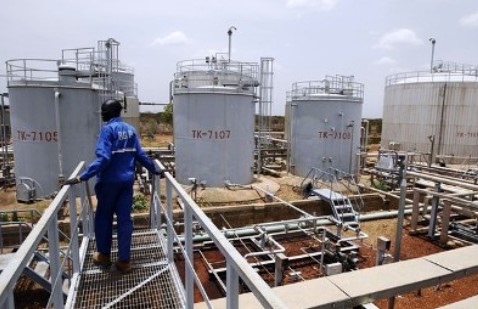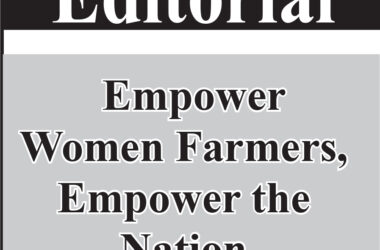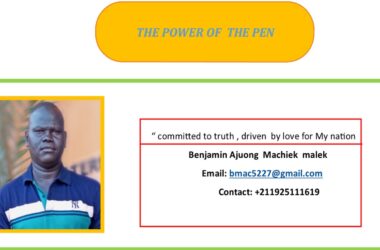By Mogga Loyo
South Sudan, a nation rich in oil reserves but grappling with economic instability and conflict, has long faced significant challenges in utilizing its natural resources to benefit its population.
One of the most prominent developments in recent months has been the government’s announcement of the reopening of its key oil refinery. This move has sparked considerable debate regarding its potential to improve the country’s economic situation, boost energy security, and, most importantly, benefit the South Sudanese people. While the reopening of the refinery offers a glimmer of hope for economic revitalization, the question remains: Will this initiative truly benefit the citizens of South Sudan, or will it serve only the interests of a few?
The Current State of South Sudan’s Oil Sector
South Sudan is one of the world’s youngest nations, emerging from decades of civil war in 2011 after gaining independence from Sudan. Despite its significant oil wealth, the country’s oil sector has been marred by corruption, mismanagement, and the impacts of conflict, especially during the civil war from 2013 to 2018. South Sudan’s oil production and exports are central to its economy, contributing up to 40% of the country’s GDP and more than 90% of its revenue.
However, the nation has struggled with basic infrastructure, including the lack of an operational refinery. Instead, crude oil has been exported for refining, which leads to high costs and dependency on foreign refineries.
Furthermore, the country’s energy needs have been primarily met through expensive imports, making the domestic population reliant on external sources for basic energy needs like fuel and electricity.
The reopening of the refinery, once a significant infrastructure project, is seen as a potential turning point. The refinery, located in the city of Juba, has been inoperative for several years due to the civil war and the economic collapse that followed. Its revitalization promises to meet domestic energy needs more efficiently and create new revenue streams for the government.
Economic Benefits: A Path to Self-Sufficiency?
At the heart of the decision to reopen the refinery is the hope that it will reduce South Sudan’s reliance on foreign fuel imports. Currently, the country spends millions of dollars each year to import refined petroleum products, a drain on its limited foreign exchange reserves. If the refinery can operate at full capacity, South Sudan could produce a significant portion of its own fuel, thus saving money and ensuring a more stable supply of energy for the nation.
Moreover, the local refining of crude oil could potentially create job opportunities for South Sudanese citizens. These jobs would range from refinery operations and maintenance to logistics, management, and administration.
The influx of employment could provide much-needed income in a country where unemployment rates are high, particularly among youth. There is also the possibility of boosting related industries, such as transportation, as more locally refined fuel becomes available for domestic use.
Revenue from selling refined products could also strengthen government finances, enabling better funding for essential public services such as healthcare, education, and infrastructure development. This could directly benefit the South Sudanese population if the funds are effectively utilized for public welfare.
Social and Energy Access: A Step toward Energy Security?
For many South Sudanese citizens, energy security is a pressing issue. Many areas of the country still rely on traditional energy sources like firewood, while others face unreliable access to electricity and petroleum products.
The reopening of the refinery offers a potential solution to some of these challenges by making fuel more accessible and affordable.
By producing its own refined petroleum products, South Sudan could alleviate the burden of fuel shortages that often occur due to supply chain disruptions or political instability. The availability of affordable, domestically produced fuel could also reduce the cost of transportation, making goods and services cheaper for South Sudanese consumers.
Furthermore, the refinery could help increase access to electricity for households and businesses. With a stable supply of refined petroleum, power generation companies may be able to operate more consistently, providing reliable electricity to a population that has been plagued by energy scarcity.
Political and Governance Challenges: A Potential Roadblock
Despite these potential benefits, there are significant concerns about whether the reopening of the refinery will translate into tangible benefits for the South Sudanese people. The country’s political landscape remains fragile, and governance issues are pervasive. Corruption, mismanagement, and the lack of accountability have hindered past efforts to develop the country’s oil sector in a way that benefits all citizens.
There are concerns that the government may prioritize short-term political and financial gains over long-term sustainable development. The reopening of the refinery could become a tool for political elites to further consolidate power and control over South Sudan’s lucrative oil sector. If the refinery’s revenues are mismanaged or siphoned off by corrupt individuals, the potential economic and social benefits could be lost.
Additionally, the South Sudanese oil sector has been plagued by conflict, with various armed groups vying for control over oil-rich regions. Although the civil war officially ended in 2018, tensions between rival factions and ethnic groups remain, and security threats to oil infrastructure could undermine the refinery’s operations. The government must ensure that the refinery remains protected from both internal and external threats to maintain stability and continued production.
Will the Reopening Benefit the Average South Sudanese?
Ultimately, the success of the refinery’s reopening in benefiting the South Sudanese people hinges on more than just the technical and economic feasibility of the project. It is closely tied to the government’s ability to use this opportunity to foster better governance, ensure transparency, and reinvest the revenues generated from oil and fuel production back into vital public services. Without these structural improvements, the reopening of the refinery risks being yet another chapter in a history of unfulfilled promises and economic mismanagement.
The South Sudanese people, particularly those in rural areas who have faced energy and fuel shortages for years, stand to gain the most from a successfully functioning refinery. However, the government’s commitment to addressing systemic corruption, ensuring equal distribution of benefits, and fostering economic diversification will be key to turning the potential of this refinery into tangible improvements for the average South Sudanese.
Conclusion
The reopening of South Sudan’s refinery represents both an opportunity and a challenge. It has the potential to reduce reliance on imports, provide jobs, and improve energy security—benefits that could directly improve the lives of South Sudanese citizens. However, whether these benefits will materialize depends largely on the government’s ability to ensure good governance, tackle corruption, and effectively manage the refinery’s resources for the benefit of the entire population.
South Sudanese people are watching closely, hoping that this new chapter in the country’s oil sector will bring real and lasting improvements to their lives.




